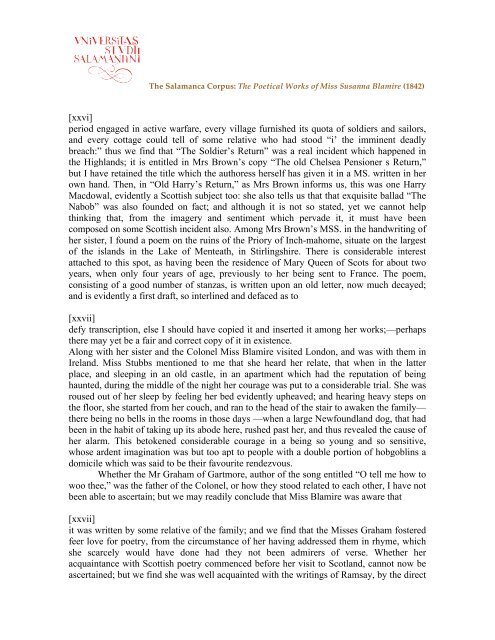The Poetical Works of Miss Susanna Blamire (1842) - Gredos ...
The Poetical Works of Miss Susanna Blamire (1842) - Gredos ...
The Poetical Works of Miss Susanna Blamire (1842) - Gredos ...
Create successful ePaper yourself
Turn your PDF publications into a flip-book with our unique Google optimized e-Paper software.
<strong>The</strong> Salamanca Corpus: <strong>The</strong> <strong>Poetical</strong> <strong>Works</strong> <strong>of</strong> <strong>Miss</strong> <strong>Susanna</strong> <strong>Blamire</strong> (<strong>1842</strong>)<br />
[xxvi]<br />
period engaged in active warfare, every village furnished its quota <strong>of</strong> soldiers and sailors,<br />
and every cottage could tell <strong>of</strong> some relative who had stood “i’ the imminent deadly<br />
breach:” thus we find that “<strong>The</strong> Soldier’s Return” was a real incident which happened in<br />
the Highlands; it is entitled in Mrs Brown’s copy “<strong>The</strong> old Chelsea Pensioner s Return,”<br />
but I have retained the title which the authoress herself has given it in a MS. written in her<br />
own hand. <strong>The</strong>n, in “Old Harry’s Return,” as Mrs Brown informs us, this was one Harry<br />
Macdowal, evidently a Scottish subject too: she also tells us that that exquisite ballad “<strong>The</strong><br />
Nabob” was also founded on fact; and although it is not so stated, yet we cannot help<br />
thinking that, from the imagery and sentiment which pervade it, it must have been<br />
composed on some Scottish incident also. Among Mrs Brown’s MSS. in the handwriting <strong>of</strong><br />
her sister, I found a poem on the ruins <strong>of</strong> the Priory <strong>of</strong> Inch-mahome, situate on the largest<br />
<strong>of</strong> the islands in the Lake <strong>of</strong> Menteath, in Stirlingshire. <strong>The</strong>re is considerable interest<br />
attached to this spot, as having been the residence <strong>of</strong> Mary Queen <strong>of</strong> Scots for about two<br />
years, when only four years <strong>of</strong> age, previously to her being sent to France. <strong>The</strong> poem,<br />
consisting <strong>of</strong> a good number <strong>of</strong> stanzas, is written upon an old letter, now much decayed;<br />
and is evidently a first draft, so interlined and defaced as to<br />
[xxvii]<br />
defy transcription, else I should have copied it and inserted it among her works;—perhaps<br />
there may yet be a fair and correct copy <strong>of</strong> it in existence.<br />
Along with her sister and the Colonel <strong>Miss</strong> <strong>Blamire</strong> visited London, and was with them in<br />
Ireland. <strong>Miss</strong> Stubbs mentioned to me that she heard her relate, that when in the latter<br />
place, and sleeping in an old castle, in an apartment which had the reputation <strong>of</strong> being<br />
haunted, during the middle <strong>of</strong> the night her courage was put to a considerable trial. She was<br />
roused out <strong>of</strong> her sleep by feeling her bed evidently upheaved; and hearing heavy steps on<br />
the floor, she started from her couch, and ran to the head <strong>of</strong> the stair to awaken the family—<br />
there being no bells in the rooms in those days —when a large Newfoundland dog, that had<br />
been in the habit <strong>of</strong> taking up its abode here, rushed past her, and thus revealed the cause <strong>of</strong><br />
her alarm. This betokened considerable courage in a being so young and so sensitive,<br />
whose ardent imagination was but too apt to people with a double portion <strong>of</strong> hobgoblins a<br />
domicile which was said to be their favourite rendezvous.<br />
Whether the Mr Graham <strong>of</strong> Gartmore, author <strong>of</strong> the song entitled “O tell me how to<br />
woo thee,” was the father <strong>of</strong> the Colonel, or how they stood related to each other, I have not<br />
been able to ascertain; but we may readily conclude that <strong>Miss</strong> <strong>Blamire</strong> was aware that<br />
[xxvii]<br />
it was written by some relative <strong>of</strong> the family; and we find that the <strong>Miss</strong>es Graham fostered<br />
feer love for poetry, from the circumstance <strong>of</strong> her having addressed them in rhyme, which<br />
she scarcely would have done had they not been admirers <strong>of</strong> verse. Whether her<br />
acquaintance with Scottish poetry commenced before her visit to Scotland, cannot now be<br />
ascertained; but we find she was well acquainted with the writings <strong>of</strong> Ramsay, by the direct
















